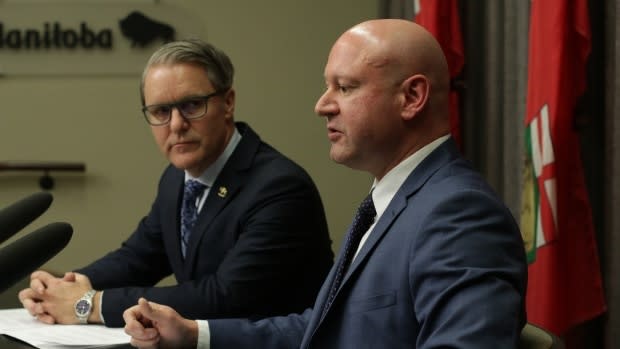Manitoba will stop identifying when COVID-19 cases are on colonies after Hutterites say they're being profiled
Manitoba health officials will no longer announce when newly identified COVID-19 cases in the province are connected to Hutterite colonies, unless there's a risk to public health, Dr. Brent Roussin said on Thursday.
The change comes a day after the minister of a southwestern Manitoba colony suggested he might file a human rights complaint against the province if health officials continued the practice.
Paul Waldner, minister of the CanAm Hutterite Colony, said for Hutterites in Manitoba facing stigma, the damage is already done.
"The government should really almost [make] a public statement and say, 'We were wrong here,'" Waldner said after the province changed course on the issue Thursday afternoon.
"People now think that because [some Hutterites] have it, they can't associate with us, there's something wrong with us."
He said it will likely take some time for Hutterite colonies in Manitoba to escape the stigma from the COVID-19 cases associated with their communities.
In a letter sent to Premier Brian Pallister and Health Minister Cameron Friesen on Wednesday, Waldner asked the province to identify only the geographic location of new cases of the illness caused by the new coronavirus, instead of a colony in that location.
Otherwise, the colony planned to file a complaint with the Manitoba Human Rights Commission, the letter said.
In some announcements this month, health officials decided to specify which cases were on colonies because news reports had already said there were cases in those communities, Manitoba's chief public health officer said at a news conference on Thursday afternoon.
The province's intention was to list the cases generally as clusters unless there's a risk to public health — which is what it plans to do from now on, Dr. Roussin said.

Roussin said he did not know if the one new case announced in Manitoba Thursday — a man in his 40s in the Interlake-Eastern Health region — was connected to a Hutterite colony.
He said it's important to be wary of perpetuating stigma attached to the illness.
"At first, we saw a lot of stigma against Asian Canadians," Roussin said. "Now, we see stigma against Hutterites for this. And it's not useful, it's not appropriate and it actually hinders public health's ability to control this virus."
Hutterites are among the first to offer to help in times of need, Waldner said, pointing to face masks colonies made and donated a few months ago and vegetables they donate to soup kitchens every year.
"My dad did it when I grew up. We continue the traditions. We don't want praise. We just want to be part of society," he said. "[Now], we're being painted with a brush, with one stroke, as being something different."
5 of 120 colonies affected
On Wednesday afternoon, seven more cases of COVID-19 on Hutterite colonies were identified in Manitoba, bringing the total number of cases in those communities in the province to 35.
In addition to experiencing cultural profiling at medical and dental offices, Hutterites in Manitoba have been refused service at physical and massage therapy clinics and retail stores, the Hutterian Safety Council said in a statement on Thursday morning.
Since the first case of COVID-19 on a Hutterite colony in Manitoba was confirmed on July 13, people in five of the province's more than 120 communities have tested positive, the statement said.
Upwards of 20 colonies in the province have now restricted travel in their communities to only essential trips, and many have increased santization protocols and established alternatives to communal meals and church services for elderly and vulnerable members, the safety council said.
Some Hutterites who tested positive for COVID-19 only have minor symptoms and are self-isolating at home. None are children, the statement said.
The council also said there is a clear link between the cases on colonies in Manitoba and travel to Alberta and Saskatchewan, though it reiterated that council members don't believe there's a link to a funeral on a colony in Alberta last month.

